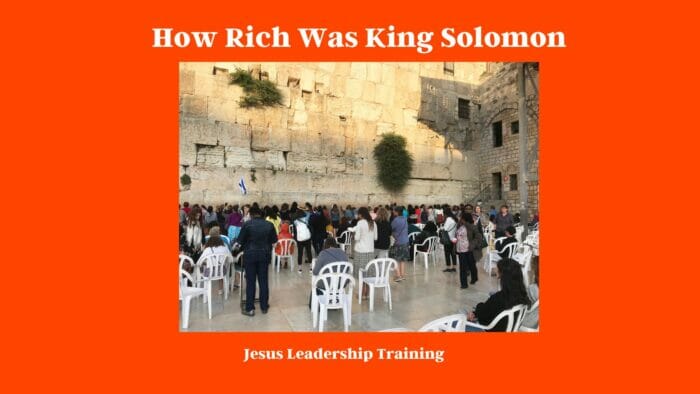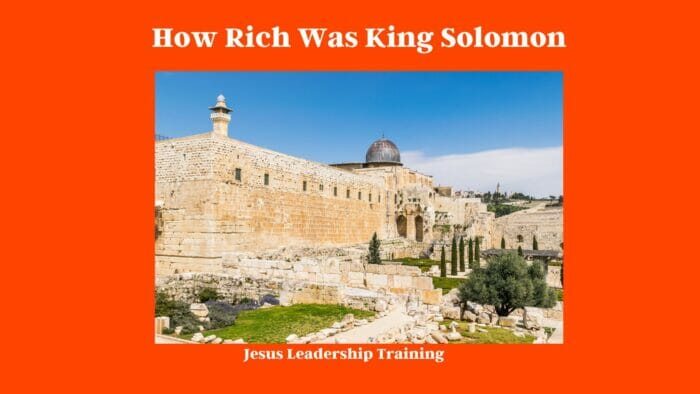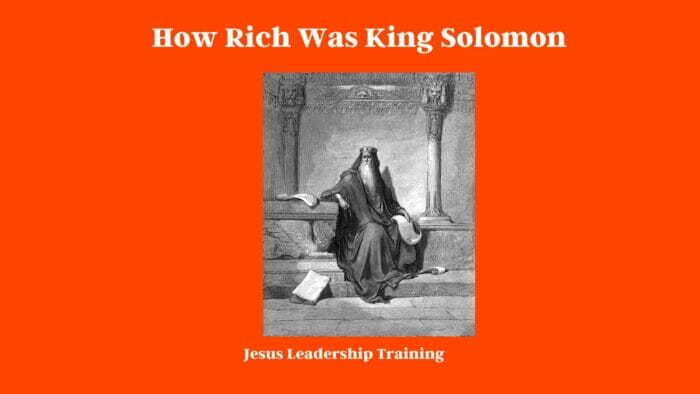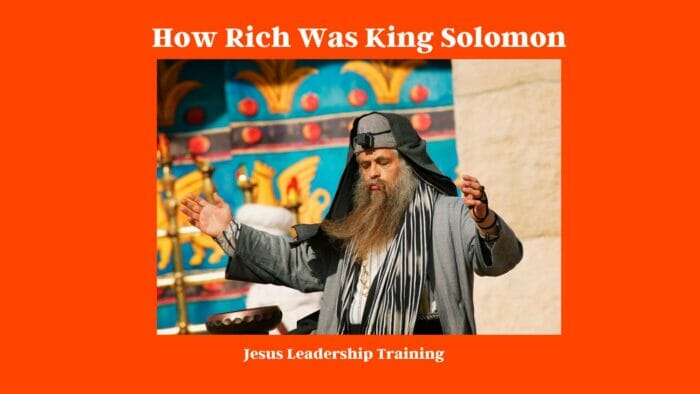How Rich Was King Solomon – Dig into the ancient world’s greatest riches as we embark on an eye-opening journey through King Solomon’s unimaginable wealth. Let’s uncover “how rich was King Solomon” and the sources of his great fortune.
Table of Contents
How Rich Was King Solomon
King Solomon, often depicted as one of the wealthiest and wisest men in history, is a fascinating figure who has long captured the collective imagination. His reign saw Israel’s golden age, with tales of extraordinary wealth and opulence that still echo through the annals of history. But just how rich was King Solomon? How did he amass his fortune, and what does it tell us about the economics of the ancient world? Join us as we set out on a quest to answer these intriguing questions.
The Historic Context of King Solomon’s Wealth
The Era of King Solomon
King Solomon’s reign, roughly around 970–931 BC, was a time of relative peace and prosperity for the Israelites. It marked an era of great expansions, be it in terms of territory, culture, or wealth. But just how does this age of prosperity translate into Solomon’s personal wealth?

Spiritual Reasons of Solomons Great Wealth
.
Here is a table listing the factors that contributed to Solomon’s great wealth, based on historical and biblical accounts:
| Factors Contributing to Solomon’s Great Wealth | Description |
|---|---|
| Wisdom and Administrative Abilities | Solomon’s renowned wisdom and exceptional administrative skills allowed him to govern the kingdom effectively. His wise decisions and policies fostered stability, which positively impacted the economic growth of Israel. |
| Trade Partnerships and International Relations | Solomon established lucrative trade partnerships, particularly with Hiram, the king of Tyre. These alliances facilitated the exchange of valuable resources, goods, and expertise, boosting commerce and contributing to the accumulation of wealth. |
| Strategic Control of Trade Routes | Solomon’s control over crucial trade routes, connecting the land of Israel to various regions, allowed him to impose tolls and tariffs, enhancing revenue generation and further enriching the kingdom. |
| Natural Resources and Agricultural Prosperity | The land of Israel was blessed with abundant natural resources, including precious metals like gold and copper, which were exploited and traded during Solomon’s reign. Additionally, agricultural prosperity, driven by favorable climate and fertile lands, contributed to the nation’s wealth. |
| Tribute and Gifts from Foreign Rulers | Solomon’s reputation for wisdom and splendor attracted gifts and tribute from foreign rulers who sought his counsel and desired favorable relations. These offerings further augmented the wealth and resources of the kingdom. |

This table outlines the key factors that contributed to Solomon’s great wealth. It highlights his wisdom and administrative abilities, trade partnerships and international relations, strategic control over trade routes, natural resources and agricultural prosperity, as well as the tribute and gifts received from foreign rulers.
While these factors played a significant role in Solomon’s wealth, it is also important to acknowledge the biblical perspective that attributes his prosperity to God’s blessing upon him. The biblical accounts emphasize the connection between Solomon’s faithfulness to God and the abundant blessings he received..
Measuring Wealth in Antiquity
Comparing ancient wealth to contemporary standards is no small feat. While it’s difficult to affix an exact dollar amount to Solomon’s fortune, we can look at accounts of his vast resources, extravagant spending, and lucrative trade routes to get a sense of his opulence.
The Foundations of King Solomon’s Wealth
Inheritance from King David
As the son of King David, Solomon inherited considerable wealth. His father’s successful military campaigns not only increased their territorial holdings but also filled their coffers with the spoils of war.

Here is a table listing the inheritance that King David left for Solomon, based on the biblical accounts:
| Inheritance | Description |
|---|---|
| The Kingdom of Israel | King David bequeathed his throne to Solomon, designating him as his successor and ensuring a smooth transition of power. Solomon inherited the kingdom of Israel and all its political authority. |
| Wealth and Treasures | David had amassed significant wealth and treasures during his reign. Solomon inherited this accumulated wealth, including gold, silver, precious stones, and other valuable resources, providing a solid economic foundation for his rule. |
| Building Plans and Blueprints | David had made extensive preparations and plans for the construction of the Temple in Jerusalem. He handed over these detailed building plans and blueprints to Solomon, enabling him to carry out the construction of the Temple according to David’s vision. |
| Wise Counsel and Guidance | As Solomon’s father, King David had been a source of wise counsel and guidance throughout his life. Though not a tangible inheritance, the wisdom, advice, and teachings imparted by David played a crucial role in shaping Solomon’s reign and decision-making. |
| Divine Promises and Covenant | David received divine promises from God regarding the perpetuity of his dynasty. Solomon inherited these promises and the covenant that God established with David, assuring him of an enduring royal lineage and the presence of God with his descendants. |
| Kingdom United and Territories Secured | Under David’s rule, the kingdom of Israel had been unified, and its territories were secured. Solomon inherited this united kingdom, including its boundaries, cities, and strongholds, providing a stable and established realm for him to govern. |
This table highlights the inheritance that King David left for Solomon. It includes the kingdom of Israel, wealth and treasures, building plans and blueprints for the Temple, wise counsel and guidance, divine promises and covenant, and a united kingdom with secured territories.
These inheritances provided Solomon with a solid foundation and resources to govern the kingdom, carry out the construction of the Temple, and uphold the divine promises given to David.
Trade and Commerce
King Solomon expanded trade routes and forged alliances that made Israel a bustling hub of commerce. Exotic goods from far and wide poured into his kingdom, further enriching the royal treasury.
Here is a table listing examples of Solomon’s expansion of trade and commerce, based on historical and biblical accounts:
| Examples of Solomon’s Expansion of Trade and Commerce | Description |
|---|---|
| Trade with Hiram of Tyre | Solomon established a prosperous trade partnership with Hiram, the king of Tyre. This alliance facilitated the exchange of valuable resources, goods, and expertise between the two kingdoms. Tyre, known for its maritime strength, provided Solomon with access to the Mediterranean trade routes, expanding Israel’s trade network and boosting economic growth. |
| Overseas Trading Ventures | Solomon’s navy, built in partnership with Hiram, allowed him to undertake overseas trading ventures. Ships were sent from the port of Ezion-Geber on the Red Sea, which enabled Solomon to engage in international commerce. These ventures involved the acquisition and transportation of exotic goods, including precious metals, gems, spices, and other luxury items from distant regions such as Ophir and Tarshish. |
| Revenue from Toll Collection | Solomon strategically controlled crucial trade routes, including those connecting the land of Israel to neighboring regions. He imposed tolls and tariffs on goods passing through these routes, generating significant revenue for the kingdom. By leveraging the strategic location of Israel, Solomon capitalized on the trade flow and accumulated wealth from the transit of merchandise and the commercial activities taking place within his realm. |
| Encouragement of Domestic Production and Agriculture | Solomon’s reign fostered domestic production and agricultural prosperity. The land of Israel, blessed with fertile soil and favorable climate, allowed for the cultivation of crops, the rearing of livestock, and the production of essential goods. This emphasis on domestic production not only provided for the needs of the kingdom but also created surplus goods that could be traded domestically and internationally, further bolstering the economy. |
| Attraction of Foreign Merchants and Envoys | Solomon’s reputation for wisdom, wealth, and splendor attracted foreign merchants, traders, and envoys to Israel. These individuals came to witness his grandeur, seek his counsel, and engage in commercial transactions. The presence of foreign merchants in Israel contributed to the exchange of goods, the transfer of knowledge and ideas, and the enrichment of cultural and economic interactions within Solomon’s realm. |
This table highlights examples of Solomon’s expansion of trade and commerce. It includes his trade partnership with Hiram of Tyre, overseas trading ventures, revenue generation from toll collection, encouragement of domestic production and agriculture, and the attraction of foreign merchants and envoys to Israel.
Through these initiatives, Solomon actively promoted economic growth, international trade, and cultural exchange, positioning the kingdom of Israel as a thriving center of commerce and attracting prosperity to the land.
Tribute and Taxes
Solomon’s reign was marked by heavy taxation and tribute from vassal states. This steady stream of income played a pivotal role in funding his ambitious construction projects and maintaining his luxurious lifestyle.
Manifestations of King Solomon’s Wealth
The Grandeur of Solomon’s Palace
King Solomon’s palace was not just a royal residence but a statement of his vast wealth. Crafted from the finest materials with unrivaled craftsmanship, it was a testament to the opulence of his reign.
The Majestic Temple of Jerusalem
The Temple of Jerusalem, constructed under King Solomon’s directive, was an architectural marvel of its time. With its gold-covered interior and precious stones, the temple’s magnificence attests to Solomon’s great riches.
The biblical accounts highlight the extensive use of valuable and precious materials in the Temple’s construction, including:
| Materials | Description |
|---|---|
| Cedar Wood | Cedar wood, renowned for its durability and resistance to decay, was extensively used in the construction of the Temple’s walls, beams, and paneling. Its fine quality and rich aroma added to the grandeur of the sacred structure. |
| Precious Stones | Various precious stones, such as onyx, sapphire, and turquoise, were utilized for decorative purposes, adorning the walls and pillars of the Temple. These stones symbolized beauty, significance, and the exalted nature of the house of God. |
| Gold and Silver | The biblical accounts emphasize the generous use of gold and silver in the Temple’s interior, including its furnishings, such as altars, lampstands, and utensils. These precious metals represented wealth, purity, and the value ascribed to the worship of God. |
| Bronze | Bronze, a durable alloy of copper, was employed extensively in crafting various objects within the Temple, such as the bronze pillars, lavers, and other ceremonial items. The use of bronze signified strength, stability, and the solemnity of worship within the sacred space. |
| Fine Linen and Embroidery | Fine linen and intricate embroidery adorned the interior of the Temple, enhancing its visual splendor. These textiles, meticulously woven and adorned with artistic motifs, added elegance and beauty to the sacred space, symbolizing the reverence and devotion of worship. |
While the exact quantities of these materials are not specified, the biblical accounts emphasize the use of these precious and high-quality resources in constructing God’s Temple. The emphasis is placed on the exceptional craftsmanship, symbolic significance, and the magnificence of the structure rather than precise measurements or quantities.
Extravagant Lifestyle and Court
The grandeur didn’t stop at structures. King Solomon led a lifestyle of extravagance. His court was filled with the finest foods, the most beautiful concubines, and the most talented entertainers.
Comparing King Solomon’s Wealth with Contemporary Figures
King Solomon vs. the Pharaohs
The wealth of the Pharaohs was legendary, but how does it stack up against King Solomon’s fortune? The answer might surprise you.
Comparing the wealth of historical figures to present-day individuals can be challenging due to differences in economic systems, currencies, and the vast changes in wealth distribution over time. However, we can provide a table that offers a general perspective on the wealth of King Solomon in relation to prominent individuals from different eras, while acknowledging the limitations of such comparisons:
| Historical Figure | Time Period | Estimated Wealth or Comparable Status |
|---|---|---|
| King Solomon | 10th century BCE | King Solomon is described as one of the wealthiest individuals in biblical accounts, known for his vast treasures, extensive trade partnerships, and control over valuable resources. |
| Mansa Musa | 14th century CE | Mansa Musa, the emperor of the Mali Empire, is considered one of the richest individuals in history due to his vast gold reserves and his legendary pilgrimage to Mecca. |
| John D. Rockefeller | 19th-20th century | John D. Rockefeller, an American business magnate, was one of the wealthiest individuals in modern history, primarily due to his dominance in the oil industry. |
| Jeff Bezos | Present-day | Jeff Bezos, the founder of Amazon and one of the world’s richest individuals, represents contemporary extreme wealth resulting from the rise of the technology and e-commerce industries. |
It’s important to note that the wealth of these individuals varies significantly based on factors such as historical context, available resources, economic structures, and different measurement methods. Additionally, wealth comparisons may not accurately capture the full economic power and influence these individuals wielded in their respective eras.
King Solomon vs. Modern Billionaires
Comparing Solomon’s wealth with today’s billionaires gives us an intriguing perspective on the magnitude of his riches. How does Solomon’s fortune compare with that of Jeff Bezos or Elon Musk?
The Legacy of King Solomon’s Wealth
Here is a table illustrating the timeline of the beginning, growth, and fall of Solomon’s wealth, based on the biblical accounts:
| Phase | Time Period | Description |
|---|---|---|
| Initial Prosperity | Early years of Solomon’s reign | Solomon’s wealth and prosperity began with his ascension to the throne. His wise decisions, administrative reforms, and trade partnerships contributed to the initial growth of the kingdom’s economy and the accumulation of wealth. |
| Peak of Prosperity | Mid to late years of Solomon’s reign | During this phase, Solomon’s wealth reached its zenith. The kingdom experienced unprecedented economic growth, driven by lucrative trade, strategic control of trade routes, tribute from foreign rulers, and the exploitation of natural resources. The grandeur of Solomon’s court and the construction of the Temple showcased his opulence. |
| Spiritual Decline | Later years of Solomon’s reign | Solomon’s pursuit of foreign alliances and marriages led to a decline in his spiritual devotion to Yahweh. His tolerance of idolatry and turning away from exclusive worship of God resulted in divine judgment and consequences that affected the stability and prosperity of the kingdom. |
| Division and Loss | After Solomon’s death | Following Solomon’s death, the kingdom of Israel split into the northern kingdom of Israel (ten tribes) and the southern kingdom of Judah (two tribes). This division weakened the nation’s economic power and led to political instability, eventually leading to the decline and loss of Solomon’s wealth. |
This table outlines the timeline of Solomon’s wealth, from its initial growth and peak of prosperity to its subsequent decline and loss. Solomon’s wise governance, trade partnerships, and control of resources initially propelled the kingdom to great prosperity. However, his spiritual decline and the resulting consequences contributed to the eventual division of the kingdom and the loss of the wealth and stability enjoyed during his reign.
The Influence on Later Generations
King Solomon’s immense wealth and wisdom left an indelible mark on history, influencing many generations to come. His wealth became synonymous with wisdom, justice, and prosperity.
The Lost Treasures of King Solomon
The wealth of King Solomon has inspired countless stories and legends. The lost treasures of Solomon, if they exist, remain one of the great unsolved mysteries of the ancient world.
FAQs about King Solomon’s Wealth
How rich was King Solomon?
It’s impossible to put an exact figure on Solomon’s wealth, but historical and biblical accounts describe a level of opulence and luxury that suggests immense riches.
How did King Solomon amass his wealth?
Solomon’s wealth came from a combination of inheritance, extensive trade routes, tribute from vassal states, and rich natural resources.
Was King Solomon wealthier than today’s billionaires?
Comparing ancient wealth with today’s standards is challenging. However, considering the wealth and resources under Solomon’s control, he could certainly rival many modern billionaires.
What happened to King Solomon’s wealth?
Much of Solomon’s wealth was likely dispersed or plundered in the years following his death. Some believe it’s still out there, forming the basis of legends about King Solomon’s lost treasures.
What are some examples of King Solomon’s wealth?
From his gold-covered temple to his luxurious palace, there are many examples of Solomon’s wealth. He was also known to have had an extensive harem, expensive garments, and a large fleet of ships for trade.
Did King Solomon’s wealth bring him happiness?
Biblical accounts suggest that despite his wealth, Solomon found life to be ultimately meaningless without spiritual fulfillment. This teaches us that wealth in itself doesn’t guarantee happiness.
Final Thoughts – How Rich was King Solomon
In the quest to discover how rich was King Solomon, we’ve traveled through time, unraveled historical accounts, and marveled at the extent of his riches. While we may never truly know the exact worth of his wealth, it’s clear that Solomon was an extraordinarily wealthy king, whose opulence shaped his legacy and continues to captivate our imagination.




